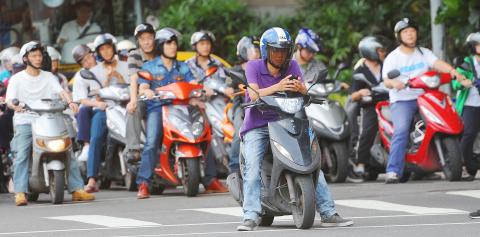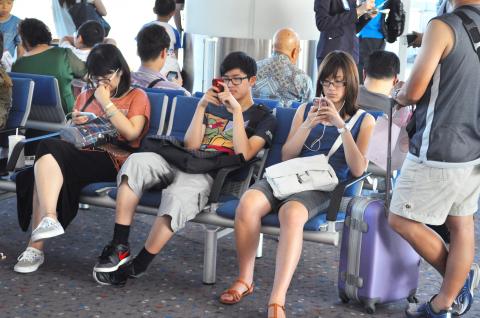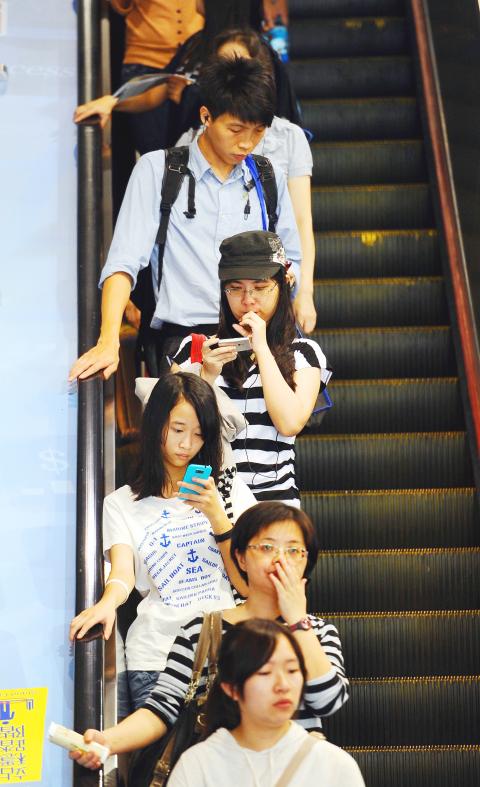Do you constantly check your e-mail accounts or refresh your Facebook page using a smartphone? If the answer is yes, you are undoubtedly one of a fast-growing demographic playfully known as the “heads-down tribe (低頭族),” which comes from a Chinese term that doctors and researchers use to describe smartphone addicts who are susceptible to traffic accidents, physical illness or psychological disconnection.
An annual survey conducted by the Taiwan Network Information Center, which investigates the use of broadband Internet services among people above the age of 12, showed a rapid increase in the number of wireless Internet and mobile communications users over the past year.
The survey showed that the number of people accessing the Internet via laptops, tablets or smartphones in the past six months in Taiwan had surged to a record 5.35 million people, twice the figure reported in the same period last year.

Photo: Liu Hsin-de, Taipei Times
“While the 5.35 million people [using mobile broadband services] may all exhibit some certain level of ‘neck-bending,’ the term ‘heads-down tribe’ refers to heavy [smartphone] users. The number of people who fit into this category would be marginally lower,” said Fu Jen Catholic University statistics professor Liang Te-hsin (梁德馨), who led the survey.
However, because of the swift progress of mobile Internet technology and the growing versatility of applications for smartphones, the number of smartphone addicts is expected to grow, Liang said.
With the “addiction” reaching epidemic proportions worldwide, several countries have enacted regulations and penalties to stop drivers from using mobile devices to decrease the potential threat to road safety.

Photo: Liu Li-jen, Taipei Times
In Japan, cyclists have been banned from using mobile phones in most prefectures. Tokyo-based Taiwanese writer Liu Li-erh (劉黎兒) said a female high-school student from Kanagawa Prefecture was brought to a family court in May to face a ¥50,000 (US$630) fine for cycling 600m while using her cellphone, despite having received four warning tickets.
The US city of Fort Lee, New Jersey, has also begun cracking down on smartphone-addicted pedestrians, passing an ordinance in March that stipulated an US$85 fine for people who walk and use their smartphones at the same time.
Fort Lee police chief Thomas Ripoli said there had been “three fatalities and 23 people injured in a three-month period due to their being distracted by technology while traveling.”

Photo: Chang Chia-ming, Taipei Times
In Taiwan, the Ministry of Transportation and Communications and the legislature in May amended the Act Governing the Punishment of Violation of Road Traffic Regulations (道路交通管理處罰條例) to clamp down on absent-minded drivers. Since September, motorists and motorcyclists caught using any portable technology device without a hands-free kit while operating their vehicles may be fined of NT$3,000 and NT$1,000 respectively.
In addition to posing dangers to other road users, the “heads-down tribe” is also prone to a series of physical discomforts, including dry eye syndrome, swollen eyes and headaches, as a result of excessive use of their eyes and maintaining an unnatural posture while viewing a smartphone screen for extended periods of time.
Tri-Service General Hospital’s Department of Ophthalmology director Lu Da-wen (呂大文) said in the past, the majority of people suffering from so-called computer vision syndrome — an eye condition that many computer users complain of after staring at unprotected screens for long periods of time — were only experiencing dry eyes.
“Now with iPads and iPhones gaining popularity, people in the ‘heads-down tribe’ are also experiencing pressure and swelling in their eyes because they are holding their necks in an unnatural posture for long periods of time, which stretches their eye muscles and causes headaches,” Lu said.
Cheng Hsin Hospital physician Chen Chien-cheng (陳建成) said the number of young outpatients coming in with shoulder stiffness or neck pain is increasing, with many saying their physical discomforts started after they began using smartphones or tablets.
Chen said smartphone addicts should not remain in a fixed posture for long periods of time, adding that they should take breaks from their devices every half hour and stretch, while resting their eyes periodically, Chen said.
Doctors and parents are also concerned about the effect that the overuse of smartphones and tablets has on the mental state of the “heads-down tribe.”
“Smartphone addiction is the same as Internet addiction, but the former is a new condition that cannot yet be medically measured by the standard rating scale,” said Chang Hsueh-ling, a psychiatrist at Chang Gung Memorial Hospital’s Department of Child and Adolescent Psychiatry.
Chang said the number of smartphone addicts seeking medical treatment was gradually increasing, with most brought in by concerned parents, who expressed frustration over their inability to communicate with their “addicted” children.
Such an unhealthy obsession could also have an adverse impact on children’s interpersonal relationships, Chang said, while urging family members to pay extra attention to smartphone-addicted youngsters.
Additional reporting by Wei Yi-chia

‘DENIAL DEFENSE’: The US would increase its military presence with uncrewed ships, and submarines, while boosting defense in the Indo-Pacific, a Pete Hegseth memo said The US is reorienting its military strategy to focus primarily on deterring a potential Chinese invasion of Taiwan, a memo signed by US Secretary of Defense Pete Hegseth showed. The memo also called on Taiwan to increase its defense spending. The document, known as the “Interim National Defense Strategic Guidance,” was distributed this month and detailed the national defense plans of US President Donald Trump’s administration, an article in the Washington Post said on Saturday. It outlines how the US can prepare for a potential war with China and defend itself from threats in the “near abroad,” including Greenland and the Panama

A magnitude 4.9 earthquake struck off Tainan at 11:47am today, the Central Weather Administration (CWA) said. The hypocenter was 32.3km northeast of Tainan City Hall at a depth of 7.3km, CWA data showed. The intensity of the quake, which gauges the actual effect of a seismic event, measured 4 in Tainan and Chiayi County on Taiwan's seven-tier intensity scale, the data showed. The quake had an intensity of 3 in Chiayi City and County, and Yunlin County, while it was measured as 2 in Kaohsiung, Nantou County, Changhua County, Taitung County and offshore Penghu County, the data showed. There were no immediate reports of

The Chinese Nationalist Party (KMT) is maintaining close ties with Beijing, the Democratic Progressive Party (DPP) said yesterday, hours after a new round of Chinese military drills in the Taiwan Strait began. Political parties in a democracy have a responsibility to be loyal to the nation and defend its sovereignty, DPP spokesman Justin Wu (吳崢) told a news conference in Taipei. His comments came hours after Beijing announced via Chinese state media that the Chinese People’s Liberation Army’s Eastern Theater Command was holding large-scale drills simulating a multi-pronged attack on Taiwan. Contrary to the KMT’s claims that it is staunchly anti-communist, KMT Deputy

RESPONSE: The government would investigate incidents of Taiwanese entertainers in China promoting CCP propaganda online in contravention of the law, the source said Taiwanese entertainers living in China who are found to have contravened cross-strait regulations or collaborated with the Chinese Communist Party (CCP) could be subject to fines, a source said on Sunday. Several Taiwanese entertainers have posted on the social media platform Sina Weibo saying that Taiwan “must be returned” to China, and sharing news articles from Chinese state media. In response, the Mainland Affairs Council (MAC) has asked the Ministry of Culture to investigate whether the entertainers had contravened any laws, and asked for them to be questioned upon their return to Taiwan, an official familiar with the matter said. To curb repeated